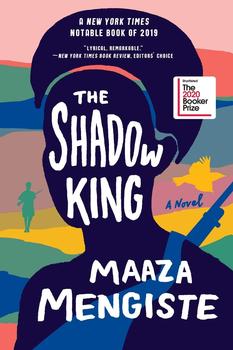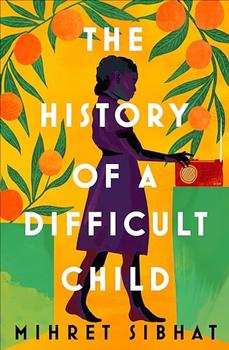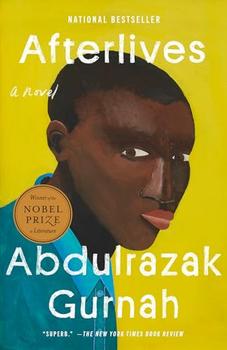Summary | Excerpt | Reading Guide | Discuss | Reviews | Beyond the book | Read-Alikes | Genres & Themes | Author Bio

A Novel
by Maaza MengisteWhile reading The Shadow King by Maaza Mengiste, I was reminded of the David Foster Wallace novel Infinite Jest. On the surface, this may seem like a far-fetched and even absurd comparison — The Shadow King is a fictional account of the role of female soldiers in the 1930s Italian invasion of Ethiopia, while Infinite Jest is a tragicomic experimental novel revolving around a mixture of plot lines in a near-future (as imagined from the 1990s) North America. Still, similarities between the two exist.
Early in Mengiste's novel, Haile Selassie, the Ethiopian emperor, is sitting in his office as his country teeters on the brink of war with Italy. Sweating under the pressure of decisions that await him in the conflict ahead, he has decided to immerse himself in newsreels, ostensibly to prep himself with knowledge, but really as an escape from the leadership required of him. This moment brings to mind for me the ever-present "entertainment cartridges" in Infinite Jest, the novel's fictional-future version of what turned out in the real world to be Netflix, which many of the characters — including royalty, namely a Saudi prince — use as a vehicle for leisure-time oblivion.
Though like Wallace's Saudi prince, Selassie is in no immediate physical danger and therefore able to turn his back on his responsibilities and his people, many of the characters in The Shadow King who are actively involved in the war exhibit their own brand of reality-displacing, illusion-fortifying behavior. Kidane, the leader of an Ethiopian defense army, sustains his confidence by exercising dominance, through sexual violence, over the women in his life — specifically his wife Aster and their servant Hirut, both of whom build resistance to Kidane's power by adding their own division of armed women to his forces as the Italian invasion rages on. Aster is in turn abusive towards Hirut, though the two develop a complicated relationship as circumstances force them to become allies. Ettore Navarra, a photographer working for the Italian colonel Carlo Fucelli, focuses on the artistic side of the exploitative pictures he takes of prisoners of war before their executions. After Selassie flees to England, a mild-mannered peasant named Minim who resembles the emperor (the "shadow king" of the title) raises Ethiopian morale by dressing the part and touring the countryside on horseback, giving people the impression that their ruler never left them.
The Shadow King, which has been shortlisted for the 2020 Booker Prize, isn't an easy read, and like Wallace's aforementioned ambitious novel, it certainly isn't for everyone. But while readers who approach it hoping for a straightforward work of inspiring historical fiction will be disappointed, those willing to let it take shape as what it is — a sprawling and poetic meditation on existence — will be richly rewarded. Applying a freeing lack of sentimentality and intense sensory-based imagery to flawed characters and complex events, the novel slides easily from the thoughts of Fucelli, as he enacts cruelties on the native people of the region; to those of Kidane, as he tries to deal with his sense of inadequacy and justify his brutality towards women; to Hirut, as she attempts to retrieve her beloved rifle, a Wujigra (see Beyond the Book), which Kidane has taken from her. Lyrical language and a flexible sense of time put the reader in textual landscapes populated with physical details that reflect the characters' states of mind, such as Hirut's as she searches for her lost weapon:
The rifle has disappeared. It is as if it never existed…Soon, she will have to admit that it is nowhere. It has slipped into a crevice that can swallow girls just as easily as it devours guns. She feels herself disappearing, senses her bones softening and sliding in her skin.
The main story of the Italian invasion and Ethiopian defense is framed by a timeline 40 years later in which Hirut is returning a box to Ettore that contains letters from his father and photographs that he attempted to hide at Fucelli's camp — Hirut was taken prisoner there, and the items later fell into her hands. Ettore seems to wish for reconciliation with Hirut, but while his own vulnerabilities allow the reader to feel sympathy for him, he does not seem to understand the full implications of his complicity in the Italian aggression. This situation gives weight to the aftermath of attempted colonization, as well as the idea that some wrongs can never be righted. The novel's examination of truths like these and what they mean to characters on a personal level is fascinating and worthwhile; it sets Mengiste's story apart from fiction that gives way to notions of heroism in war or even fiction that simply emphasizes war's destructive nature.
The Shadow King leverages its historical details to uncover new ways of thinking about how people arrange their inner worlds in order to preserve a sense of self. By exploring its characters' dreams, denials and constructed realities, it engages in conversation with other literature that documents the human experience on a large scale.
![]() This review
first ran in the October 21, 2020
issue of BookBrowse Recommends.
This review
first ran in the October 21, 2020
issue of BookBrowse Recommends.

If you liked The Shadow King, try these:

The History of a Difficult Child
by Mihret Sibhat
Published 2024
A breathtaking, tragicomic debut novel about the indomitable child of a scorned, formerly land-owning family who must grow up in the wake of Ethiopia's socialist revolution

by Abdulrazak Gurnah
Published 2023
From the winner of the 2021 Nobel Prize in Literature, a sweeping, multi-generational saga of displacement, loss, and love, set against the brutal colonization of East Africa.
Your guide toexceptional books
BookBrowse seeks out and recommends the best in contemporary fiction and nonfiction—books that not only engage and entertain but also deepen our understanding of ourselves and the world around us.